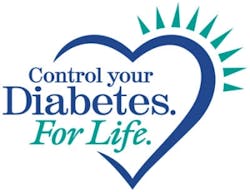Public education program aims to change the way diabetes is treated
By Winnie Furnari, RDH, MS, FAADH
The NDEP National Diabetes Education Program Networking Meeting, “Celebrating NDEP: Past, Present and Future,” was held Oct. 2-3, 2011, at the Centers for Disease Control in Atlanta, Ga. Over the course of two days, there were presentations from renowned leaders in the field of diabetes in our government institutes. There were breakout sessions on various topics offering tools to address topics such as behavior change, disparities, communication and resources. Stakeholders came away with an increased level of knowledge about the program, people and of course diabetes, and are charged with doing their part to get the word out about the program and about the universality and increase in diabetes diagnoses worldwide. One catch phrase is that “Diabetes is common, serious, costly and controllable.”
The National Diabetes Education Program is the Federal government’s leading public education program for diabetes prevention and control. It is a joint program of National Institutes of Health (NIH) and the Centers for Disease Control (CDC). Over the years, the NDEP has developed an impressive library of evidence-based, culturally tailored, and easy to read materials on diabetes prevention and control. Its main goal is to reduce the morbidity and mortality associated with diabetes and its complications by changing the way diabetes is treated. This networking group, PPOD, includes Pharmacy, Podiatry, Optometry and Dentistry. It is a multidisciplinary team that helps to disseminate important information to communities across the country. It is advisory and helps to develop products.
The PPOD working group is developing a Primer that is sharing information from the disciplines of Pharmacy, Podiatry, Optometry, and Dentistry as “teach the professional” information to be mindful of when treating or screening for diabetes. The Primer will be updated within the next year and will be a valuable resource and instrument to distribute. Why does diabetes continue to command our attention? Because every 24 hours, there are: 4,100 new cases of diabetes, 810 deaths due to diabetes, 230 amputations, 120 kidney failures, and 55 new cases of blindness
Diabetes can lead to changes in the oral cavity. Of particular concern to dentists and dental hygienists are the effects of diabetes on the health of the gingiva and periodontal tissues. Poor glycemic control is associated with gingivitis and more severe periodontal diseases. Oral signs and symptoms of diabetes can also include a neurosensory disorder known as burning mouth syndrome, taste disorders, abnormal wound healing, and fungal infections. A multidisciplinary team approach is critical to success in diabetes care and complications prevention.Working Together to Manage Diabetes is available at www.ndep.nih.gov.November is National Diabetes Month. Visit www.diabetes.org for information and events.
Winnie Furnari, RDH, MS, FAADH, is the American Dental Hygienists’ Association liaison to the National Diabetes Education Program: Pharmacy, Podiatry, Optometry, Dentistry (NDEP PPOD Work Group). She is an assistant professor in dental hygiene at New York University.





